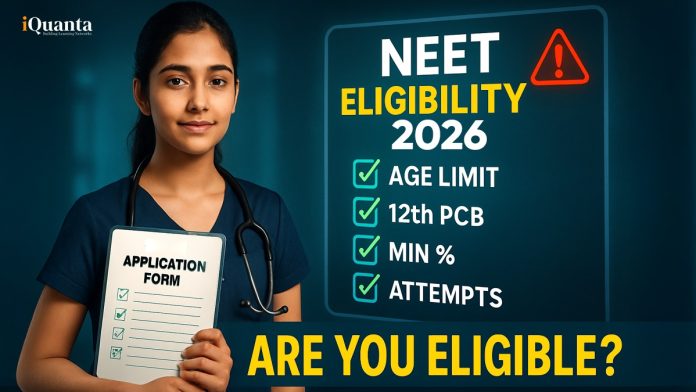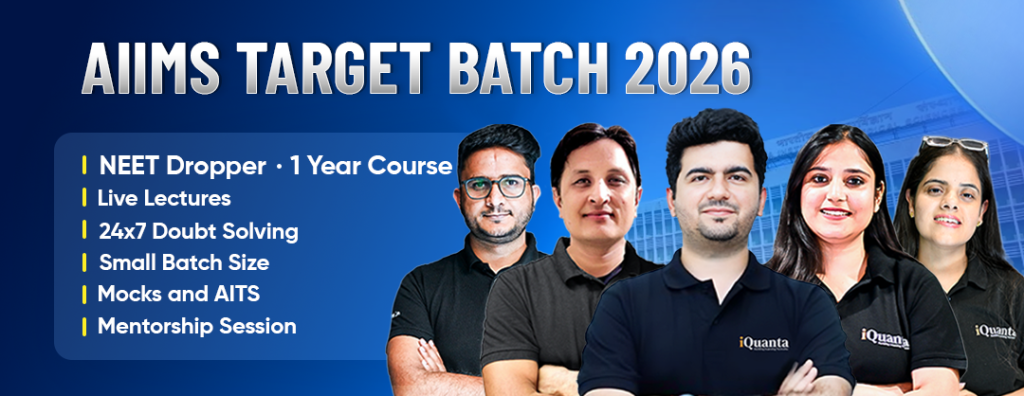NEET eligibility criteria 2026 are important guidelines for students preparing for the NEET exam next year. National medical entrance exam NEET is open to Indians and foreign nationals both. Students over or at par with 17 years of age are eligible to write the NEET 2026 examination. An upper age limit has not been set for NEET 2026.
At 10+2 level, candidates must either appear or must have previously appeared for Physics, Chemistry, Biology or Biotechnology. They must also have English as a core subject. The minimum marks required in the last qualifying examination for the general category students is 50%, 40% for OBC/SC/ST and 45% for PwD general category.
In accordance with the rules of the NTA, there is no bar on the limit of NEET 2026 attempts. Students having passed or appearing for the class 12 examination must be under the State or Central government recognized boards such as CBSE, ICSE, NIOS, etc. The reservation criteria in the All India Quota seats for SC category is 15% and 7.5% for the ST students.
It is important for NEET aspirants to completely understand the NEET eligibility criteria 2026 before applying for the NEET exam and any kind of discrepancy can lead to disqualification at the later stage. Candidates also ensure about their documents which includes age proof, academic certificates, category certificates and photo ID and it should be accurate and updated as per the official guidelines. Moreover, students educated abroad and also wish to appear for the NEET must have studied Physics, Chemistry, Biology and English must have passed the equivalent of class 12th with the required percentage from a recognized board or university. If aspirants verifies the NEET eligibility criteria in advance helps you to streamline the application process and prevents last minute rejection or any kind of disruptions. Read below to know important points regarding NEET eligibility criteria 2026.

Join the free NEET whatsapp group for latest NEET updates and other important information
NEET Eligibility Criteria 2026 Highlights
The NEET eligibility criteria 2026 covers the important aspects such as age, nationality, academic qualifications along with the reservation policies. Candidates must be at least 17 years old and should have completed or be appearing in their 10+2 exams with the subjects include Physics, Chemistry, Biology/Biotechnology and English. As per the NEET eligibility rules, there is no upper age limit on the number of attempts that allows students to provide greater flexibility in pursuing medical education. So, these guidelines ensure that every candidate is based on a fair and consistent basis.
NTA NEET eligibility criteria 2026 includes important components such as age limit, number of attempts, nationality and so on. Check highlights on NEET eligibility criteria 2026 below.
| Particulars | Details |
| Nationality | Indian Citizen NRIs OCIs Persons of Indian Origin, and Foreign Nationals |
| Minimum Age Limit | 17 years |
| Education Requirements | 10+2 with PCB/Biotechnology and English |
| Number of Attempts | Unlimited |
| Reservation for AIQ Seats | Yes |
Academic Eligibility Criteria 2026
It is very important for every NEET aspirant to meet NEET eligibility criteria 2026, aspirants should have studied a specific set of core subjects during their 10+ 2 education which includes Physics, Chemistry and Biology or Biotechnology are mandatory along with English as a core. These subjects are required to build an academic foundation for medical education and are assessed during the NEET exam preparation due to basic concepts present in the books. Candidates who have completed their Class 12th board examination or appearing for their boards both are considered as eligible under the NEET eligibility 2026.
- Physics
- Chemistry
- Biology or Biotechnology
- English
Required Aggregate Marks for NEET 2026
At least 50% aggregate marks are required under the general category for NEET 2026 eligibility conditions fulfillment. The minimum marks criteria for each student category for the NEET 2026 exam is provided below.
| Marks Percentage for NEET 2026 | |
| Student Category | Minimum Aggregate Percentage |
| General | 50% |
| OBC | 40% |
| SC | 40% |
| ST | 40% |
| PwD | 45% |
Age Eligibility for NEET 2026
17 years is the minimum mandatory age limit as per the NEET eligibility criteria. For taking the NEET exam in 2026, the upper age limit is non-existent. Check the table below for eligibility criteria related to age of a candidate for taking the NEET exam next year.
| Age Eligibility Criteria for NEET 2026 | |
| Particulars | Age Limitations |
| Maximum Age Limit | No Limit |
| Minimum Age Limit | 17 Years |

Join the free NEET whatsapp group for latest NEET updates and other important information
NEET 2026 Eligibility Based on Nationality
NEET eligibility criteria specifies the conditions for eligibility based on a candidate’s nationality. As per the NEET eligibility criteria 2026, there are 5 categories of eligible candidates including Indian and foreign citizens. All 5 nationality governed categories are as mentioned under.
- Indian Citizens
- Foreign Nationals
- Non-Resident Indians
- Persons with Indian Origin
- Overseas Citizens of India
NEET 2026 Score Validity
Students who are taking the NEET 2026 exam next year may actively apply for admissions as the validity of the NEET 2026 score is only for 1 year. Whereas for MBBS abroad, the validity period is longer for a candidate’s NEET 2026 score.
| Validity of NEET 2026 Score | |
| Parameter | Validity Period |
| MBBS India (Domestic) | 1 Year |
| MBBS Abroad (International) | 3 Years |
Number of Permissible Attempts
You can write the NEET exam as many times as you want. You can re-attempt the NEET exam in 2027 or 2028 to achieve the desired marks. Here is the answer to how many times can I take the NEET exam or what are the number of permissible NEET attempts?
| Attempts for NEET | |
| Examination | Number of Attempts |
| NEET | Unlimited |
Qualifying Exam Board for NEET 2026
For NEET 2026, students must have qualified or must be in the process of qualifying from Central or State government recognized education boards only. Here is a list of class 12 board exam boards which are recognized under the NEET eligibility criteria 2026.
- State Boards
- CBSE
- ICSE
- NIOS or State Open School Boards
NEET 2026 Eligibility Criteria for Foreign Nationals
Students who have completed their 10+2 from abroad must submit a Certificate of Equivalence and must have completed their graduation in Physics, Chemistry, Biology and English.
| NEET 2026 Eligibility Criteria for Foreign Nationals | |
| Particulars | Details |
| Certificate of Equivalence | Association of Indian Universities |
| Graduation Degree | Recognized International Education Board |
| NEET Qualification Time | In the admission year |
| Marks Criteria | Must be the same as Indian medical college standards |

Join the free NEET whatsapp group for latest NEET updates and other important information
Domicile Eligibility Criteria for NEET 2026
To avail the benefits of domicile reservation criteria for the NEET 2026 exam, candidates belonging to a particular State must fulfil the state-specific eligibility criteria. The table below summarizes the eligibility for domicile candidates for NEET 2026.
| Domicile Eligibility Criteria for NEET 2026 | |
| Seat Quota | Eligibility |
| 85% State Quota Seats | Fulfillment of domicile requirements of the State is a must. |
| 15% All India Quota Seats | Open to All Indian citizens |
15% AIQ Seats Reservation Criteria for NEET 2026
Tabulated below is a quick glimpse of the important reservation percentages of the 15% AIQ seats for the NEET 2026 exam.
| 15% AIQ Seats Reservation Criteria for NEET 2026 | |
| Category | Reservation Percentage |
| General EWS | 10% |
| OBC-NCL | 27% |
| SC | 15% |
| ST | 7.5% |
| PwD Horizontal Reservation for All Categories | 5% |
State-wise NEET Eligibility Criteria
When it comes to a term NEET eligibility then each Indian state has its own set of domiciles mentioned for admission under the 85% State Quota seats in medical colleges. Whereas the basic NEET eligibility 2026 remains the same for all which includes the components such as age, subjects, marks etc. to claim State Quota. It is important for aspirants or candidates that they must satisfy state-specific domicile rules by their respective state authorities. Understanding these guidelines in advance is really helpful for NEET aspirants so that they don’t miss out on the valuable government medical seat opportunities in your home state. A detailed information table about the domicile requirements is stated below:
| State | Domicile Eligibility Criteria |
| Maharashtra | Candidate must have passed 10th & 12th from Maharashtra and/or possess a domicile certificate. |
| Uttar Pradesh | Must be a resident of UP and have completed 10+2 from a school/college in the state. |
| Tamil Nadu | Completion of 10+2 from Tamil Nadu; residence/domicile proof required. |
| Delhi (NCT) | Students who have passed Class 11 and 12 from Delhi schools are eligible for State Quota. |
| Rajasthan | Candidate must have studied for 5 years continuously in Rajasthan OR have a state domicile. |
| Bihar | State domicile certificate and completion of 10+2 from a Bihar institution are required. |
| Kerala | Candidates should be of Kerala origin or hold a domicile and have studied in Kerala. |
| West Bengal | Should have studied and resided in WB for a certain number of years or have a domicile. |
| Karnataka | Candidates must have completed 7 years of education in Karnataka OR possess a state domicile. |
| Madhya Pradesh | Domicile certificate and schooling in MP are generally required for state quota. |
| Telangana | Completion of 4 years of study in the state or holding a domicile certificate. |
| Andhra Pradesh | Candidate must be a local/non-local as per AP educational rules (A, B, C categories). |
| Gujarat | Domicile certificate or completion of Class 10 & 12 from Gujarat is required. |
| Punjab | State domicile plus education in Punjab required for claiming 85% seats. |
Common Mistakes That Can Disqualify You in NEET Eligibility
There are some common mistakes that can lead you for the disqualification in the NEET eligibility.
- Wrong subject combination in your 10+2 as it should be Physics, Chemistry and Biology/Biotechnology
- Scoring below minimum marks requirement.
- Your education board should be recognized and valid.
- Incomplete documents can lead to disqualification.
- If you lack in meeting age requirements.
- No equivalence certificate (as this is for foreign students)
- Misinformation in application form. So it is recommended to every NEET aspirant to cross-check once before submitting your application form.
- Applying Without Mandatory Aadhar or Valid ID
NEET Eligibility vs NEET Qualification
| NEET Eligibility | NEET Qualification |
| Basic conditions to appear for the NEET exam. | Minimum score/criteria to qualify and be considered for admission. |
| Checked before applying for the exam. | Assessed after taking the exam based on the NEET score/result. |
| Age limit, nationality, subject combination, minimum 10+2 marks, valid documents. | NEET score above the cutoff, All India Rank, meeting college/university cutoff. |
| Set by NTA and Medical Council of India (NMC). | Based on exam results and counselling authority/college cutoffs. |
| To ensure the candidate is eligible to write the exam. | To decide if the candidate can be admitted to MBBS/BDS/other medical courses. |
Conclusion: NEET Eligibility Criteria
Understanding the NEET eligibility criteria 2026 is the first and most important step towards your dream of becoming a doctor. From age limit and academic qualification to the reservation policies, each requirement must be carefully reviewed before filling the NEET application form. Failing to meet the NEET eligibility criteria can result in disqualification no matter how well you perform in the NEET exam. Make sure your documents, subject combination and category details are accurate and up-to-date.
By staying informed regarding the details and verifying your eligibility in advance helps you avoid last minute note and you will move confidently towards your medical career goals.
FAQs
For NEET 2026, students having an Indian citizenship proof are eligible. Foreign students or NRIs are also eligible. Indian students travelling overseas, and those having an Indian origin residing elsewhere are also eligible for MBBS/BDS admissions.
40% marks in 10+2 PCB subjects is the NEET eligibility criteria for OBC category students.
17 years is the minimum age limit while maximum limit does not exist.





